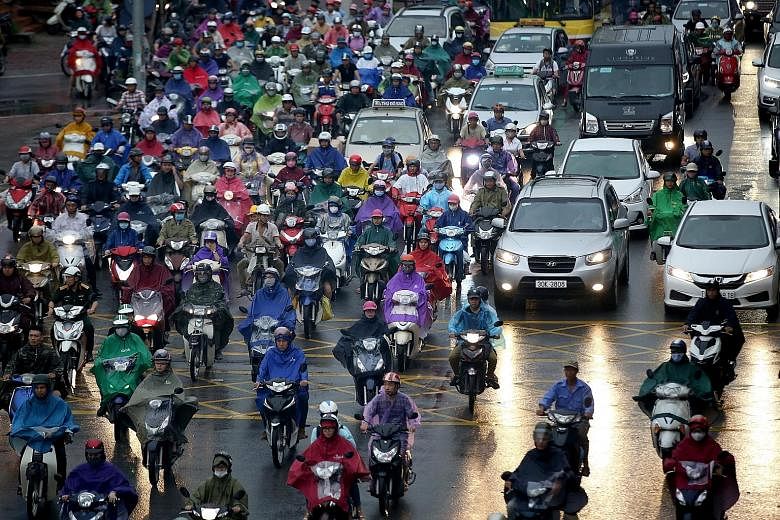HANOI • Officials in Vietnam's traffic-choked capital Hanoi vowed yesterday to banish motorbikes by 2030 to ease environment and congestion woes, a decision that swiftly divided a city where two-wheelers are the main means of transportation.
Hanoi is famed for legions of motorbikes - sometimes stacked with entire families or overloaded with deliveries - that clog roads in a fast-growing city with limited public transportation.
There are five million motorbikes among a population of about seven million, compared with half a million cars on the road. Critics blame the emissions-heavy motorbikes for Hanoi's deteriorating air quality and worsening traffic congestion.
The decision to ban motorbikes by 2030 was approved by 95 out of 96 city councillors at a meeting yesterday. Officials said the number of vehicles was growing at an "alarming" rate, according to a report on the city government's website.
"Traffic jams and air pollution will become serious in the future if no immediate management measures are in place," the report said. It added that the authorities would increase public transport options to wean people off their scooters.
Opinions of the decision were sharply divided on social media.
"This is wonderful news, showing strong determination from the authorities to deal with the city's uncontrolled and chaotic traffic," said motorbike rider Nguyen Nam.
Others were sceptical about whether the government will really offer viable public transport alternatives as promised.
"This idea is totally insane," said office worker Hoang Thuy Duong, who rides a motorbike to work daily. "Motorbikes are the best means of transportation in Hanoi. I doubt the authorities can replace them with public vehicles," she told Agence France-Presse.
Hanoi does not have a metro system. It has only public buses, which account for 12 per cent of travel demand in the city. Officials said yesterday they plan to boost that share to around 50 per cent by 2030.
Construction of a sky train in the city has been repeatedly delayed, but is slated to open next year.
The number of registered motorbikes in Vietnam is among the highest in South-east Asia, and officials in Hanoi have long mulled over banning the bikes in an effort to modernise the city.
Experts have blamed Hanoi's poor air quality in part on harmful emissions from cars and motorbikes, especially in major cities.
Hanoi is forecast to have six million motorcycles on its roads in the next three years, according to the city government.
AGENCE FRANCE-PRESSE, REUTERS

